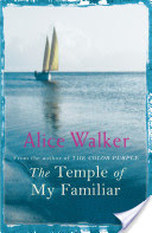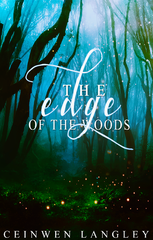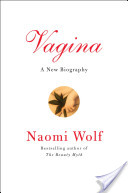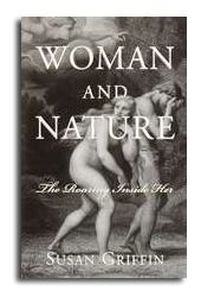|
Woman and Nature: The Roaring Inside Her by Susan Griffin is an ecofeminist book telling of how science, reason and thought throughout history lead to the domination of women and nature. I love her way of writing, 'it is decided', 'it is said', 'it is written'... the timeline of thoughts that now seem so ridiculous when stated in this way, yet underneath it is still a truth we hold in some way to this day. The mysteries of our bodies have not been entirely solved, women still do not know their own bodies. These 'primitive' thoughts are still thought in some places, by some people today... and so are not primitive at all, but exist in the here and now, along with us. Women are less in spirit ''And it is said that the souls of women are small.'' Women are less in body ''(And it is written that women, on discovering they have ovaries, are liable to become arrogant through this knowledge.) And we seek dumbness.'' Women are less in sexuality ''And it is said that all girls are born castrated.'' Women are a great mystery, like nature ''of the nature of earth, rock, river, cloud, light, wind, breath, flesh, of mules, of horses, of birds, of the body of woman, womb, breast, vulva, hair, it is acknowledged these are still unknown.'' Women are to be conquered, like land ''a countrey that hath yet her mayden head, never saht, turned, nor wrought.'' - Sir Walter Raleigh, discovery of Guiana. ''This wild abyss, the womb of nature and perhaps her grave.'' - John Milton, Paradise lost All set out this way, sentences and sentences, words and words, phrases and phrases, some alien, some only too recognisable, shows how deep the psyche of separation from nature, from men, from ourselves has fallen. That people think, write, assume these things without considering the depth of damage that may be done from these words. The power of words. The beliefs and 'truths' that arise from one simple thought. And untangling it all is seemingly impossible. Yet the damage is still being done, we see the suppression of women, and we see the destruction of our environments, that these words and sentences helped to create. But there is an ironic beauty in this book. Because Susan Griffin is woman, and she is nature, and she can look at these words, set them down, illuminate them, show them in their grievous ridiculousness, and recreate them as beautiful, as poetry. There is beauty in her comparisons of a women's dressing room and a show horse dressage, of a caged lion that could well speak of an imprisoned woman. She tells two stories at once... ''We heard of this woman who was out of control. We heard that she was led by her feelings. That her emotions were violent. That she was impetuous. That she violated tradition and overrode convention. That certainly her life should not be an example to us. (The life of the plankton, she read in this book on the life of the earth, depends on the turbulence of the sea).'' She takes all, from everywhere, to weave deeply into societies thoughts... ''And so it is Goldilocks who goes to the home of the three bears, Little Red Riding Hood who converses with the wolf, Dorothy who befriends a lion, Snow White who talks to the birds, Cinderella with mice as her allies, the Mermaid who is half fish, Thumbelina courted by a mole. (And when we hear in the Navaho chant of the mountain that a grown man sits and smokes with bears and follows directions given to him by squirrels, we are surprised. We had thought only little girls spoke with animals.) '' We go on a timeless journey of humanities rises and falls, and feel keenly, with our own womanly bodies, all that is said and all that is written. And at the end is a breath of fresh air, that we may find ourselves, our own bodies, without these thoughts, limitations, assumptions, if we go back to our original home. Just Earth. ''I have known her all my life, yet she reveals stories to me, and these stories are revelations and I am transformed... This Earth is my sister, I love her daily grace, her silent daring, and how loved I am... and I do not forget what she is to me, what I am to her.'' Related Posts Ecofeminism
1 Comment
 The Temple of My Familiar By Alice Walker I first read Alice Walker at college when I was studying English Literature and one of our books was The Color Purple. I absolutely loved this book, and believe that the moment I read about Celie and how she was raped by her ‘father’- turned out to be her stepfather- was a moment that would define the rest of my life. It had recently been revealed that my cousin went through a similar ordeal, at a similar age, so that probably had a lot to do with it. So it was with some excitement and some trepidation that I picked up my second Alice Walker novel- In the Temple of my Familiar. From a feminist point of view it is incredible- the way she constructs the story of many women from many places and times, and the subtlety in which their numerous sufferings are revealed. It is compassionate but never patronising and makes the reader feel such an array of emotions. From an anthropologists point of view it is fascinating. The character of Lissie is indescribable in few words but I will give it a shot! Lissie is an old black American woman who can remember all her past lives- right back to when she was a pygmy in Africa and was living with her ‘big cousins’. Every single story she reveals about these times has something interesting to say about the present situation today. Had the book been only about her I would have been enthralled! But there are so many different characters- male and female, spanning continents: Latin and North America, Africa and Europe, spanning time zones: the 1980s, the colonial age, the slave trade. Our wonderful Celie and her lover Shug, from The Color Purple, even make their appearance. The way Walker weaves the web of these stories throughout the book is wonderful. And every now and then, right in the middle of one of these stories, the reader comes across a spider in the web, that jumps out at you unsuspectingly. A little snippet of wisdom that hits you full on and you think ‘yes! Exactly right!’ Covering so many issues: sexism, racism, government corruption, religion. I have included a few quotes below to give you an idea- but without the surrounding story they do not have the same effect. Throughout the book one question kept popping up in my mind: How can one writer be so wise? Give me more Alice Walker! On religion: ‘’The religion that one discovered on one’s own was a story of the earth, the cosmos, creation itself; and whatever ‘’God’’ one wanted could be found not down the long road of eternity, but right in one’s own town, one’s home, one’s country. This world. After all, since this world is a planet spinning about in the sky, we are all of us in heaven already!’’ On politics: ‘’ ‘I realise,’ she whispered to Nzingha, ‘that there is not a single government in the world I like or trust. They are all, as far as I’m concerned, unnatural bodies, male-supremacist private clubs.’ ‘’ On the male view of sex: ‘’And I was brought up on Playboy, in which the goal of every red-blooded man is to pierce as many women as possible, to think of their minds, their creative gifts, and their professional abilities as added sexual stimulation, nothing more. I loved that joke inspired, I’m sure, by the Playboy mentality: What did you do with the female scientist who discovered a cure for the common cold? You screwed her. Yuk, yuk.’’ On marriage: ‘’ Besides, in her view, joining with another was such a sacred affair there was almost no way it could be done with other people present, a good number of them strangers, friends of friends, relatives you didn’t like, and others who couldn’t possibly appreciate the significance of the moment.’’ On white supremacy: ‘’ …black is a colour the sun loves. The African white man could not blame the sun for his plight, not without seeming ridiculous, but he could eventually stop people from worshipping it. He could put a new god in its place that more closely resembled himself: cold, detached, given to violent rages and fits of jealousy. He needed to create a new god, since the one the rest of his world worshipped was so cruel to him. Burned him. How fortunate that he finally stumbled into the Mediterranean, into Europe. The coolness must have felt exquisite.’’ On feminism: ‘’She thinks of white feminists she knows who are happy that they can at last express their anger. In their opinion, this is something white women have never done. They think the ability to express anger is something the white woman has to reclaim. But this seems like a delusion to Fanny. For she knows the white woman has always expressed her anger… against people, often men, but primarily women, of color. And what did that get her? Well, today it made it hard for black women to talk to her, because they not only remember the white woman’s ability to express anger, but they expect a replay of this anger any minute. These same women, interestingly, thinks Fanny, always claim they fear the black woman’s anger, and for that reason say they are afraid to struggle seriously with her.’’ A snippet of wisdom: ‘’ ‘you must live in the world today as you wish everyone to live in the world to come. That can be your contribution. Otherwise, the world you want will never be formed. Why? Because you are waiting for others to do what you are not doing; and they are waiting for you, and so on. The planet goes from bad to worse.’’ And my favourite quote- a man who was checking out a woman’s tits ‘inadvertently read her t-shirt. It said: ‘A Woman without a Man Is like a Fish without a Bicycle.’ '' Absolutely!  The Edge of the Woods By Ceinwen Langley Ceinwen Langley is someone I will never forget. From the moment we met I found her an energetic, interesting young woman (with an eye for good-looking men with long hair), who I instantly felt a connection with. I was absolutely delighted when Ceinwen finished her first novel- The Edge of the Woods. I couldn’t wait to read it. And I wasn’t disappointed. For the first time in a long, long time, I had found a book that refused to be put down- I ended up reading it in one day, finishing in the early hours of the morning! Ceinwen weaves the story of a world that at first seems a little ridiculous and very unlike our own- the stupid rules that everyone has to abide by even though they make no sense; women who are not married being ridiculed and shunned because ‘the numbers didn’t work out’ (i.e there were not enough men to go round); the atmosphere of depression and pressure leading some girls to be led astray in search of a better life. But as I got to know the characters a little better, and understood how the society worked, I realised that this invented world is sadly similar to many societies in our world today. How women must constantly look their best for fear of being laughed at; how women’s education is stunted because apparently all they really need to know is how to be a wife and mother; how marriages are arranged between people that don’t love each other because of some crazy sense of ‘what is right’; how people are so petrified of change that they refuse to even contemplate speaking up against authority. The little subtleties in the story make it a great one, like the imagery of the iron bracelets the women may be forced to wear- like shackles imprisoning them from their basic rights. I absolutely recommend this book by a fantastic new author- and I look forward to reading many more. All that remains to be said is: Well done Ceinwen, until we meet again! To read more about the Ceinwen go to her website: http://ceinwenlangley.com/  Vagina By Naomi Wolf This is the first article I ever wrote for my original website... this book is the beginning of it all! I was recently in a book shop searching for something interesting to read, when this title jumped out at me. I couldn’t resist buying it. It took me a long time to get through it, as every page held new treasures or dark tales, of which I knew nothing. Which begs the question… how can I know so little about myself? I want to start by telling you about this book because it’s where the journey began for me. More than any book I have ever read, ‘Vagina’ changed my life. First of all it made me know myself in a completely novel way. Everything, and I mean EVERYTHING a woman thinks or feels is all down to her vagina. The age old phrase ‘men only think with their penises’ should also apply to women and their vaginas. A woman’s health and happiness is absolutely dependent upon the health and happiness of her vagina. If the vagina is looked after, the woman is happy. If the vagina is abused and not healed, the woman can only hope for a slither of the happiness she could have had. I am not going to go over the multitude of examples, facts and science that goes behind these statements- I will let Naomi Wolf do that- but I only want to demonstrate the affect it has had on me. Every time I think about a boy I ask myself if I would be making my vagina happy or doing her a dis-service? Every time someone talks of a vagina being abused (even in ‘rape jokes’), I feel it in my own vagina- like it’s been poked it in a particularly unpleasant way. I feel it in the pit of my stomach, like by just hearing the words I fear for the safety of my own vagina. This even happens when I hear the often used and misunderstood ‘see you next Tuesday’ word (and Naomi Wolf tells us all there is to know about ‘the worst word in the world’). She also talks about the ‘vaginal pulse’, which I feel all the time now I know about it- sometimes someone will do something good or unexpectedly nice for me, my vagina pulses- telling me she’s happy! The second way the book changed my life was to explain to me why and how women are so repressed in the world. First of all is a background to the history of the repression of women- from the end of the ‘pagan’ religions (i.e the beginning of monotheistic religions like Christianity, which repress everything to do with the feminine and make us believe that one man is in charge of everything)- to the Victorian age. In spite of everything that went before it- monotheism, witch-burning and other evil medieval practices, Henry VIII who believed it was OK to chop off his wife’s head if she couldn’t produce a son- none of this was as damaging for women as the Victorian age. And having a Queen on the throne only made it worse- she would not even entertain the fact that women should have the right to vote. And this is the age when doctors decided that women should give birth lying down (probably the worst way to do it), because it would save the poor doctors’ backs aching. Then is the chapter about ‘the abused vagina’. This took me so long to read because I kept having to stop, put it down to absorb the horrifying information, usually allowing myself a little cry in the process. I would say it took about 16 goes for me just to get through the one chapter. If you think about what I have just written about how my own vagina reacts to different situations, isn’t it obvious that for anyone who wants power over women, the best way to do it is to attack the vagina? An unhappy vagina means a submissive woman- simple as that. So when I think about the one billion women in the world that have been raped or beaten in their life time- I know why. When I read about the millions of women who have been raped in the Congo and other war zones- I know why. When I wake up every morning thinking about the women and girls who are living with the effects of Female Genital Mutilation- I know why. A woman’s vagina is directly linked to the brain- so if a woman is raped, maybe physically, emotionally and mentally she will recover, but her vagina NEVER will. As I said above, even ‘the worst word in the world’ hurts my vagina, makes it tense. If the most fragile and sensitive part of a woman’s anatomy is attacked it is in a permanent state of tension and fear. Repeat- it NEVER recovers. And neither does the brain it is linked to. And what this book has taught me more than anything else is that this need for people (notice I am NOT specifying MEN) to repress female sexuality by abusing or mutilating their vaginas is far from accidental. Because women with healthy vaginas are happy, and so much more powerful, they are free and can achieve whatever they want. Which brings me to the third way the book changed my life-
it helped me be closer to my mind, my heart, and aim in my life. I will to use the power I am lucky to have to change other people’s lives, and I hope to begin here and now, by teaching others what I have learned. |
Archives
February 2017
Categories |

 RSS Feed
RSS Feed